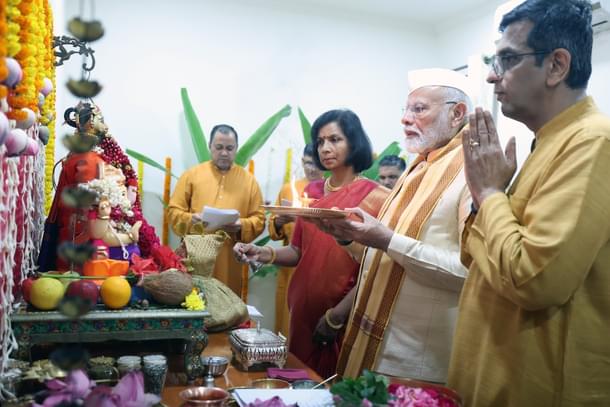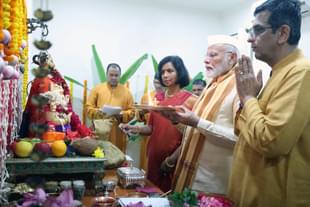Politics
Ganapati Pooja At CJI Residence: Neither Justice Chandrachud Nor PM Modi Owe An Explanation To Anyone
Aravindan Neelakandan
Sep 15, 2024, 12:49 PM | Updated 12:49 PM IST
Save & read from anywhere!
Bookmark stories for easy access on any device or the Swarajya app.


On 11 September, 2024, Prime Minister Narendra Modi participated in a Ganesh Puja hosted by Chief Justice of India (CJI), DY Chandrachud, in New Delhi, on the occasion of Ganesh Chaturthi. The Opposition and its allied ecosystem has criticized this severely.
Advocate Indira Jaising, who previously advised the mother of Nirbhaya, the victim of a horrific gang rape and murder, to 'follow the example' of Congress leader Sonia Gandhi by pardoning the four convicts, has now stated that the CJI has compromised the separation of powers between the executive and judiciary.
On the other hand, senior Supreme Court advocate Mahesh Jethmalani defended the Prime Minister's actions, stating there was nothing wrong with them. He further noted the irony in the criticism, pointing out that when Dr. Manmohan Singh hosted Iftar parties and the then-Chief Justice attended, it was hailed as 'the epitome of secularism' by the same critics.
However, this event, far from being merely acceptable, carries significant and positive implications.
For one, the CJI, Dr Chandrachud, is known for his strong liberal values, to the extent that some have even labeled him as "woke." Yet, as the event showed, he marks Ganesh pooja in as a traditional a manner as anyone.
In a time when public expressions of Hindu religious worship are often associated with conservative or right-wing politics, the participation of an apparently liberal CJI highlights the multidimensional, all-encompassing nature of Hinduism.
It demonstrates that both conservatives and liberals can find their roots in Hindu Dharma. A liberal worldview grounded in Hindu philosophy is not only possible but arguably necessary.
The Chief Justice of India previously revealed that during the pandemic, Prime Minister Modi had expressed concern for his health and well-being. In February 2024, it was the CJI, and not the Prime Minister, who shared this information. The CJI said: "The Prime Minister called me when I was down with Covid and arranged for a consultation with an AYUSH vaidya. I took the medicine and did not require allopathic treatment in subsequent Covid infections."
However, none of that stopped the Supreme Court from striking down the electoral bonds scheme just before the Parliamentary elections. Moreover, the Supreme Court went a step further, compelling a seemingly hesitant State Bank of India (SBI) to not only halt the issuance of these bonds immediately but also to submit details of donations made through this mechanism to the Election Commission of India (ECI). That was considered as a serious setback to the BJP.
Had a similar judgment been delivered by a judge against the policies of a Prime Minister from the Nehru-Gandhi family, or even against the UPA led by an unofficial 'super PM' like Sonia Gandhi, one can guess how that judge would have been sidelined by the relevant power centres. But here, one sees the PM and the CJI sharing a cordiality that befits a festive occasion, with both fully aware that their world-views hold significant differences.
When the PM took a humane interest in the health of the CJI, he knew this. When the the CJI invited the PM for Ganesh pooja, he knew this.
The invitation by the CJI and the participation by the PM are then not a sign of judiciary giving in to political power. Neither is it the violation of the border between judiciary and the executive. Quite the contrary, it shows the opposite.
The judiciary and the executive are well aware of their respective boundaries and it is fitting that Ganapati marks the start of this era of a fearless judiciary and a non-vindictive executive—in stark contrast to the way the executive functioned under Nehru-Gandhi regimes.





